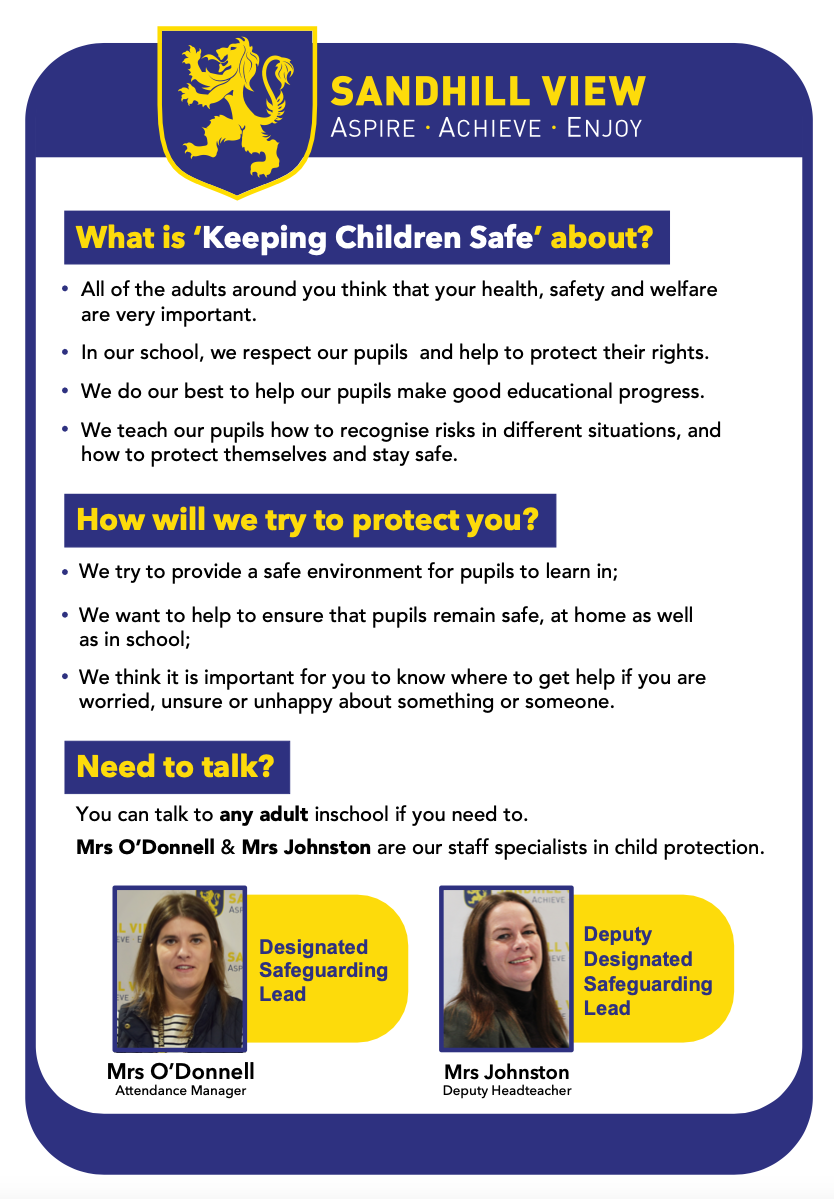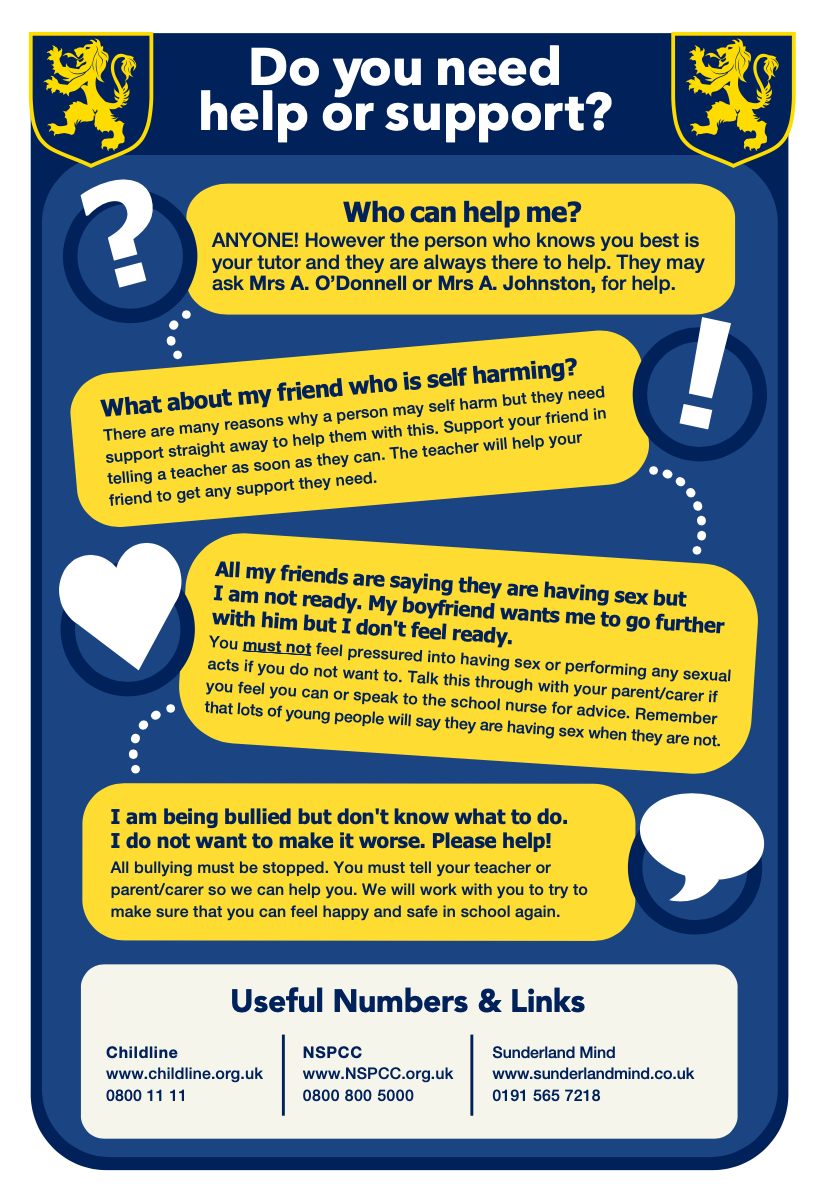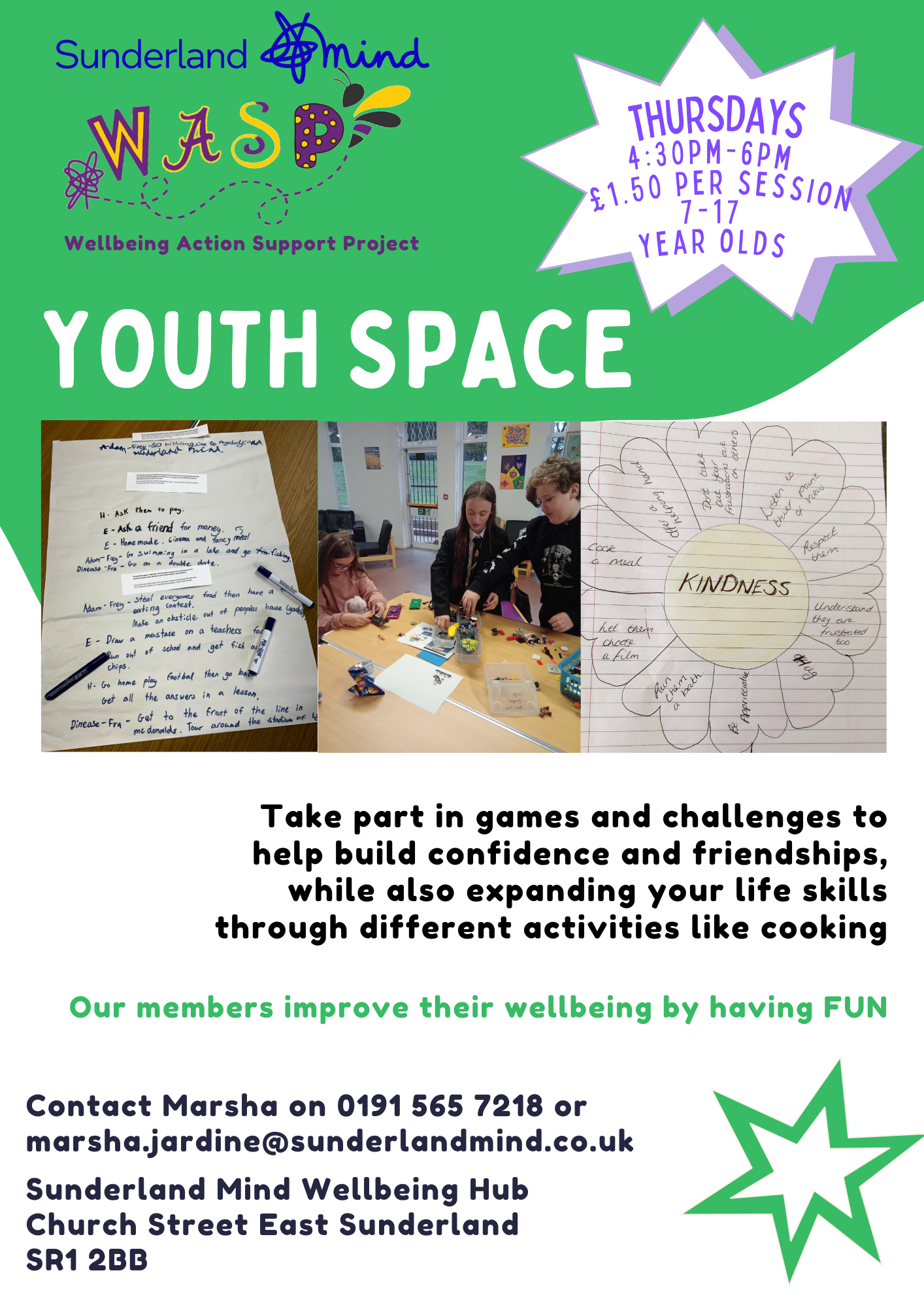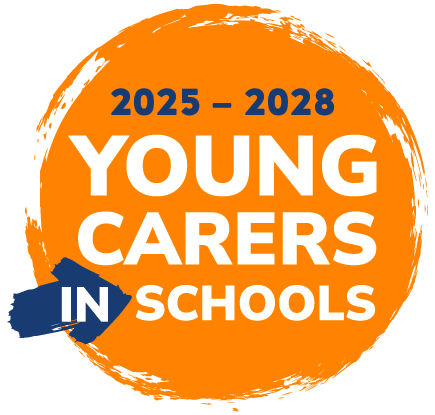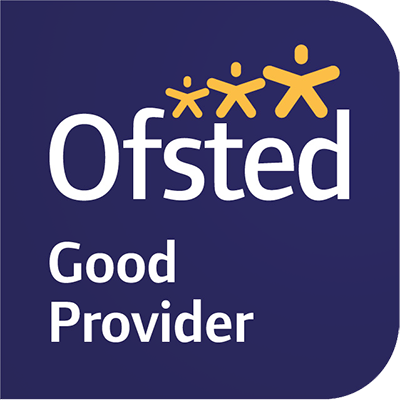 At Sandhill View Academy we are always concerned about the health and well-being of our pupils. We know school life can be difficult and we are always standing by to help with any troubles that are stopping you from enjoying your time at Sandhill View. If you have any worries and need to talk at anytime (even during the holidays) then we’re here to help you. Speak directly to your tutor during term time, or message us using the confidential student support form here.
At Sandhill View Academy we are always concerned about the health and well-being of our pupils. We know school life can be difficult and we are always standing by to help with any troubles that are stopping you from enjoying your time at Sandhill View. If you have any worries and need to talk at anytime (even during the holidays) then we’re here to help you. Speak directly to your tutor during term time, or message us using the confidential student support form here.
Safeguarding at Sandhill View
Safeguarding and promoting the welfare of children is of paramount importance and is everyone’s responsibility within Sandhill View Academy & The Aspire North East Multi Academy Trust.
It is the responsibility of every member of staff, volunteer and regular visitor to our trust to ensure that they work in a way that will safeguard and promote the welfare of all of the pupils within the trust. This includes the responsibility to provide a safe environment in which children can learn.
We recognise that staff within our Trust play a particularly important role as they are in a position to identify concerns early and provide help for children to prevent concerns from escalating. All staff are advised to maintain an attitude of ‘it could happen here’ where safeguarding is concerned. When concerned about the welfare of a child, staff members must always act in the best interests of the child.
The health and safety of the whole school community is paramount at all times. The Governing Body, Head teacher and all staff take their responsibilities very seriously. We adhere strictly to our Safeguarding & Child Protection policy. This can be found in the policy section of our website.
Our designated school leads for student safeguarding is Mrs A. O’Donell who is located in the Attendance Office on the technology corridor.
Our deputy designated safeguarding lead is Mrs A. Johnston who is located in her office next to reprographics.
Every member of our school staff receives safeguarding training and so is always available to talk to you should you need to speak with someone.
For specific issues and online guidance please look below to find the relevant advice.
The Safeguarding Team at Sandhill View Academy
Do You Need Support?
Operation Encompass
The purpose of Operation Encompass is to safeguard and support children and young people who have been involved in a domestic abuse incident. Following an incident at home, children will often arrive at school distressed, upset and unprepared for the day.
Sunderland City Council, Northumbria Police and nominated Key Adults in school will be working together to make sure that school staff are made aware of an incident early enough to support pupils in school.
Why has Operation Encompass being introduced in Sunderland?
Operation Encompass was initially launched in Plymouth in February 2011 to address a shortcoming in the early sharing of information with schools. Since then several pilots have been set up across the UK, including the North East, and has proved to very successful in providing appropriate support in a timely manner. Pilots across the UK have reported positive outcomes for many children and young people.
Sunderland City Council, Northumbria Police and all schools in the city are taking part in the scheme, to help provide additional new support which will benefit children and young people in Sunderland and improve multi-agency sharing of information.
How will it work?
Schools across Sunderland will nominate two members of staff who will be known as Key Adults. All Key Adults will attend specific training to the role in preparation for Operation Encompass.
Each morning a police officer will review all domestic abuse incidents that occur outside of school but which might have had an impact on a child attending school the following day. Where children were present, witnessed or involved in a domestic abuse incident and aged between 4 and 16 years old, the officer will send this information to the Council’s Initial Contact and Referral Team who will then send this information in a secure format to the named Key Adult in the child’s school. The Key Adult will check their emails every day and the staff in contact with those pupils will then be in an informed position to support them in a way that is right for the child.
This information will be shared on school days during school term and, when incidents occur on a Friday, Saturday, Sunday or over a holiday period, the police will contact the Council the following Monday.
All new parents will be sent a letter from their child’s school informing them about Operation Encompass.
Operation Encompass, please contact your school or visit http://www.operationencompass.org/
Operation Encompass at Sandhill View Academy
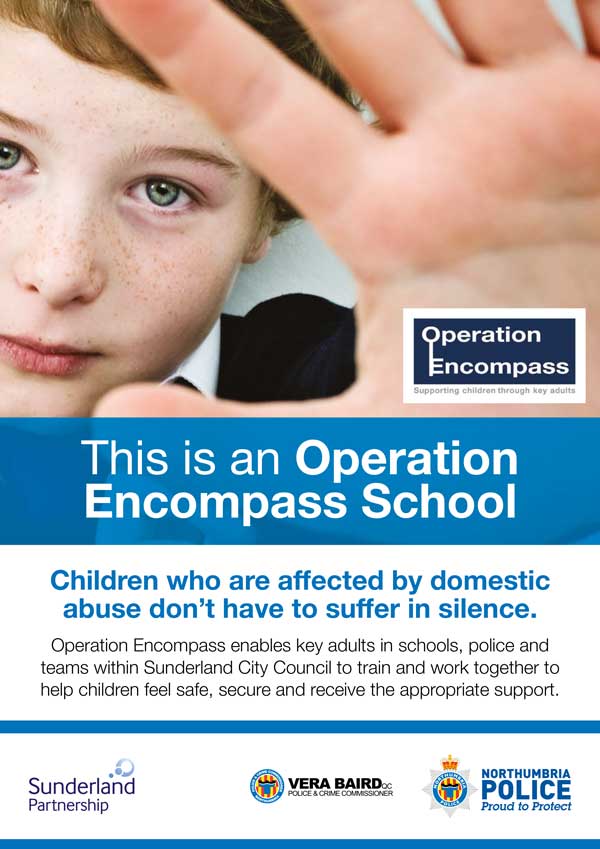

Together for Children works with children, young people and families in Sunderland. If you’re a child or young person in Sunderland and need help outside of school hours there are people who can help, including Together for Children.
If you have a safeguarding concern about a child or young person, please contact Children’s Safeguarding on 0191 561 7007.
Please note, this number should only be used during the following hours: Monday to Thursday, 8.30am to 5.15pm and Friday, 8.30am to 4.45pm.
If you are ringing out of hours (evenings and weekends) please contact our Emergency Duty Team on 0191 520 5560.
You can find more information here.
Further Information, Advice & Resources
Below you will find a wide range of resources, links and websites that you can use to find help or support for a variety of issues that may be troubling you. Don’t forget you can always speak to an adult member of staff in school about any of these issues, we are always here to help and support you.
General Safeguarding Contacts and Advice
General Advice
Streetwise
Provides information, advice and counselling for young people aged 11-25 years around issues such as housing, smoking cessation, contraception, sexual health, substance use, relationships and sexuality.
35-37 Groat Market, Newcastle upon Tyne
Tel: 0191 2305 400
Childline
This is a free 24 hour helpline for young people in distress or danger. Their website also has a lot of information, support and the chance to ask any questions you may have.
Tel: 0800 1111
The Samaritans
A free source of help for anyone who wants to talk to someone anonymously for support.
3 Grange Crescent, Stockton Road, Sunderland, Tyne and Wear SR2 7BN
Tel: 08457 90 90 90
Health Advice
Health Advice
Young Minds
This website has a lot of information about mental health issues including living with adults who have a mental health condition.
Your Health
An excellant website specifically designed for children and young people with health concerns in Sunderland.
NHS 111
111 is the NHS non-emergency number. It’s fast, easy and free. Call 111 and speak to a highly trained adviser, supported by healthcare professionals. They will ask you a series of questions to assess your symptoms and immediately direct you to the best medical care for you.
Tel: 111
Drink Aware
The Drinkaware Trust is an independent UK-wide alcohol education charity, funded largely by voluntary and unrestricted donations from UK alcohol producers, retailers and supermarkets. The Trust is governed independently and works in partnership with others to help reduce alcohol-related harm by helping people make better choices about their drinking.
Sunderland Smoking Service
Looking to quit smoking? Look no further than Sunderland’s stop smoking service! We’re here to help you start your quit story today.
www,sunderlandstopsmokingservice.co.uk
Alcohol Awareness
A useful document that highlights the dangers of under-age drinking and alcohol abuse in young people. Click here to view.
Advice Regarding Porn
Watching porn alone, in a private place can be a very healthy part of someone’s sex life and self-discovery and is nothing to be ashamed of, however, we must be careful to make sure that we recognise and understand what is safe and healthy when it comes to pornographic materials.
This helpful hand out by brook.org can help educate young people about porn, what is legal, what is safe and what you need to understand in its relation to real-life healthy relationships.
Advice on Bullying
Bullying Advice
We encourage you to tell someone with any problems you might be having with bullies. School staff are always ready to hear your problems and help. You can also report any bullying you may experience or see to yourHead of Year on this page.
BullyingUK
Help and advice about bullying, remember if you feel you are being bullied than you should always tell someone. This website is an excellent first step to dealing with the problem.
Tel: 0808 800 2222
Cyber Bullying
Bullying isn’t something that just happens in the real world. More and more teenagers are being bullied online through social networking sites. If you are getting threatening messages online, there are a number of ways to get them stopped.
Advice on Staying Safe Online
How to Stay Safe Online
You can download a school leaflet with information all about how to stay safe online here.
Advice for staying safe online
The internet and social media sites can be very useful tools for communicating with others we may not see very often or research on topics for school or social purposes. However it is also a tool that can be misused in a number ways and it is important we protect ourselves from any dangers whilst using internet sites.
- NEVER post your address or phone numbers online.
- NEVER meet someone who you have only ever spoken to online.
- NEVER share details of your school.
- NEVER post pictures of you in your school uniform.
- Use only age-appropriate sites.
- If you see something online that makes you feel uncomfortable, unsafe or worried: leave the website, and tell a trusted adult immediately.
- Keep your usernames and passwords safe at all times.
- Think about what you post and how it could be misinterpreted.
- Think carefully before posting pictures or videos of yourself. Once you’ve put a picture of yourself online people can see it and download it, it’s not just yours anymore.
- NEVER post or send provocative pictures of yourself or others.
- Respect other people’s views, even if you don’t agree with someone else’s views doesn’t mean you need to be rude.
- ALWAYS make sure you have closed profiles and only add people you know.
- Remember whatever you post will stay on the web forever!
- Be aware that people online are not always who they say they are. If you are unsure tell someone!
Advice for staying safe on your mobile
You also need to be careful and considerate when using your mobile devices. Below are some tips for being safe on your phone. Remember mobile devices will be confiscated for the week if staff see them being used in school.
- NEVER reply to any nasty messages you receive – tell an adult about them instead.
- NEVER reply to a text from someone you don’t know.
- Keep the messages you have been sent so you can show them to a trusted adult and make a note of the time and date of the messages or calls you receive.
- NEVER answer calls from withheld numbers or numbers you don’t recognise, let it go to voicemail.
- NEVER give your mobile number to someone you don’t know.
- NEVER send pictures to someone you don’t know and be very careful about sending pictures to anyone on your phone.
Advice for if you are being bullied online
If you feel you are being bullied online it is important that you let a trusted adult know about it. Cyber bullying is still bullying and has the same affect as normal bullying. Here are some tips to help you should you feel like you are being cyber bullied.
- Tell an adult you trust if you are being cyber bullied.
- NEVER respond or retaliate to bullying messages – it could make things worse.
- ALWAYS Block users who send you nasty messages.
- Save abusive emails or messages (or texts) you receive and show an adult.
- NEVER pass on any cyber bullying videos or messages – this is also cyber bullying.
Thinkuknow
A dedicated site set-up by the national crime agency full of young people’s advice for staying safe online.


